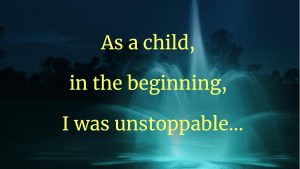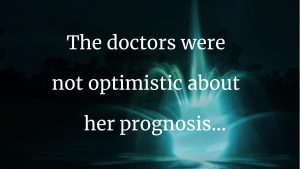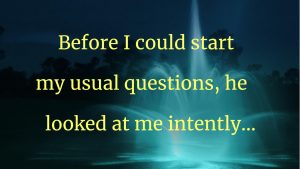Sauntering into the dark hospital room, I was dazzled by my patient’s radiant smile. It spanned her face and crinkled her eyes; her crooked teeth peeked through her lips, making her seem approachable and kind.
“Hi, Ms. Radha, I’m a third-year medical student,” I said. “Is this an okay time to chat? I’m here on behalf of the psychiatry department.”
She let out a giggle. “Hi! Now is a good time. It’s nice to meet you.”
Her slight Indian accent was not lost on me. Studying her, I saw a woman who could have been my mom, years ago.
My mom, an undeniably strong woman, had entered an arranged marriage and had moved with her husband to the US, across the world from everyone she loved. She’d done her best to raise two children in a new country while working full-time at a financial company.
Forcing a smile despite the knot in my stomach, I walked across the room and locked eyes with my patient, trying to distract myself from the scar running across her neck.
And just like that, it was as if we were the only two people in the hospital. My tension melted under her calm, familiar gaze—just like my mom’s when she was happy to see me.
“Can you tell me a little bit about yourself?” I asked gently, hoping that she’d volunteer her psychiatric history and spare me from having to ask questions that might feel too personal for both of us.
“I live about an hour away,” she said. “I have a beautiful four-year-old girl, and I’m a homemaker. I love cooking and crafting with my daughter. My husband is a wonderful father.”
Her words lingered in the air. I focused on my own breathing.
Suddenly a scene from my past barged into my consciousness. I was no longer a twenty-three-year-old medical student; instead, I was six-year-old girl standing beside my mom’s hospital bed, not understanding why she was there or why she was sick.
A nurse gave my mom a concerned look, then turned to me.
“You’ll never be alone. Every time you or your mom gets sad, hug Becky,” she said, handing me a baby-sized doll dressed in a hot pink shirt and dark blue jeans. Becky had straw-colored rope for hair.
I remember hugging Becky and trying to look into my mom’s eyes. Tears streamed down her cheeks.
Desperately trying to suppress this memory, I focused on my patient.
“You like cooking?” I exclaimed. “That’s so cool! What do you like to cook?”
“All kinds of baked goods!” she replied. Her direct simplicity was a welcome counterbalance to the dark, complex emotions I was experiencing.
Although she’d answered none of my psychiatric questions, her response made me like her even more. For some time we chatted about cooking, crafting and her daughter, and I was pleased to see her eyes light up as we talked.
Finally I forced myself to glance at the neck scar that had brought her here. Thick white bandages hid her slit wrists.
Just as gauze and medical tape were covering her wounds, her smile was masking her depression. We both knew this.
“How are you feeling? Do you mind sharing what brought you into the hospital?” I ventured, not really wanting to hear the truth, but knowing that I needed to in order to better care for her.
She looked at me for a second, then at her wrists. As she began to talk, her smile slowly faded.
“I have bipolar disorder, but a while ago I stopped taking my meds because they make me feel like a zombie. I’m a very happy person. I’m very bubbly, I love meeting new people, and I enjoy inviting everyone over to my home. But on the meds…I didn’t feel like myself. I felt like a shell of who I am. When I looked in the mirror, I couldn’t recognize myself.”
I nodded. “I’m really sorry you felt like that—it must have been so scary. Did you notice an immediate change after you stopped taking your meds?”
“Yes, there was a change. I was in my ‘maniac’ state—and it felt so good! I felt like I could do so much in one day. I didn’t need to sleep, and I got to spend so much time with my daughter. We laughed so much! But then I started feeling really depressed. I couldn’t control it.”
Another memory intruded: My mom and I, laughing as we sat on our patio lawn chairs and made shapes out of the clouds floating above us.
“I love you with my whole heart, sweetie.”
“I love you too, Mama.”
Ms. Radha’s solemn voice brought me back.
“I know it was selfish of me, but I didn’t feel needed. My husband is a good father, and I knew he’d be able to take care of my daughter. I felt it would all be okay.”
I wished those words did not sound so familiar.
Tears slowly welled up underneath her eyelids, ready to fall. Reflexively, I grabbed her hand and rubbed it gently, as I wished I’d been old enough to do for my mom eighteen years ago.
“I just want you to know that it wasn’t your fault,” I told Mrs. Radha. “You clearly love your daughter very much, and you were operating with a chemical imbalance in your brain. Your daughter is lucky to have such a strong and caring mother.”
Speaking these words, I didn’t know whether they were for her or for myself.
I paused, wanting to say something about South Asian culture, which often equates mental illness with weakness.
“I know that in Desi culture, mental health issues aren’t really believed in or talked about. I’m not sure if you’ve had difficulty gaining support from your loved ones, but I want to say that you are doing the best you can, and that your bipolar disorder is real. It is a chemical disorder—and with the right treatment, we can help you feel like your normal self, so you can have even more beautiful moments with your daughter.”
Our eyes met. Her eyebrows relaxed, her gaze softened, and she slowly nodded.
In that moment, by saying the words I wish I could have said to my mom during her darkest moment, I felt a sense of healing and closure.
I could bring this up with my mom now—but in our culture, dwelling on painful memories is frowned upon. We pick ourselves up, piece ourselves back together and move on.
For some reason, I hadn’t been able to do so. Even though my mom’s self-destructive intentions, fueled by environmental stressors, weren’t realized that night, they had remained painful for me—a memory buried so deep inside that it shocked me when it emerged.
This encounter made me realize how misguided it would be to think that I can completely separate my emotions from my work as a healthcare professional. I’m a flawed, imperfect human being, and I have a story that may resonate with some patients more than others. Similarly, some patients will tap into the vulnerable side of my personality.
Now I know that every so often I’ll meet patients who will help me to heal parts of myself that I didn’t even know were broken.









7 thoughts on “Double Take”
Thank you for sharing this. You went with your feelings and let yourself be vulnerable in your approach to helping her. We need more doctors like you.
Healing comes in all forms!
Beautifully written!
Hugs!
You narrate a very important lesson. Our relationships with our patients are gifts to us as much as they are hopefully gifts for each of them— if our eyes and hearts are open to receive a relationship generating truth. Sometimes they knock us off our feet like your beautiful story. Sometimes they are more subtle. Sometimes they heal us. They always grow us and they are always there. Thank you for sharing one of yours.
This tale of yourself as a wounded healer is beautiful and inspiring. Well done. May your continuing journey bring healing all around.
Thank you Syona for this contribution. It is so important to remember our own humanity despite the outward appearance of professionalism. Your honesty and insight are valued. Thank you.
Beautifully expressed and very moving. You will do much good in the world.
Thank you for sharing this beautiful story with us. Sometimes opening up more to our patients helps both of us to heal. -Josh N, Pediatric Palliative Care